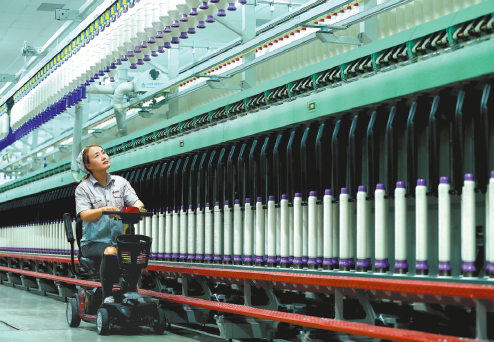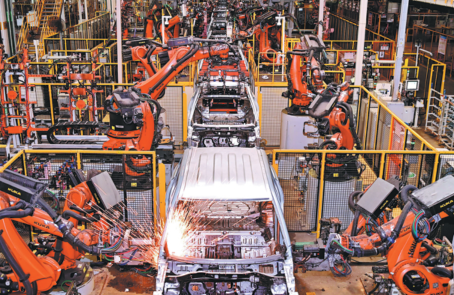Traditional sectors bloom in new thrust
China stresses their upgrade via sound measures in smarter, greener directions

China, the world's manufacturing powerhouse, is facing a big challenge as it scrambles to cultivate cutting-edge technologies and emerging fields, and deal with its sprawling traditional industries such as steel, nonferrous metals and building materials.
Though some have called these "low-end" and urged for the phasing out of such industries, arguing that they are not productive enough and could trigger negative environmental fallout, China's top industry regulator has expressed a more rational view.
Jin Zhuanglong, minister of industry and information technology, has said that China's traditional industries are vast and account for over 80 percent of the manufacturing sector, including steel, nonferrous metals, petrochemicals, building materials, light industry, machinery, textiles and apparel, foods, and traditional Chinese medicine.
These traditional sectors form the foundation of the modern industrial system, are crucial to economic development and people's livelihoods, and are essential for maintaining China's status as the world's leading manufacturer, Jin said.
"Regardless of the present or the future, traditional industries should not be simply labeled as 'low-end industries' and phased out. We must prioritize the transformation and upgrading of traditional industries, employing a set of 'comprehensive measures' to accelerate their development toward higher-end, smarter and greener directions, allowing traditional industries to 'blossom anew'," Jin added.
Looking ahead, Jin's ministry will focus on implementing high-end, intelligent, green and integrated technological renovations of traditional industries, supporting new technology pilot projects, and executing major manufacturing technological upgrades and large-scale equipment renewal projects. The aim is to rejuvenate traditional industries, making them carriers of new quality productive forces.
A typical example is the collaboration between Inspur Yunzhou, a unit of Inspur Group that focuses on the industrial internet, and Hansy Mining Co Ltd, a manufacturer of mining crushing and screening equipment. The two companies have launched an industry case application aimed at transforming traditional machinery into smart equipment.
This initiative focuses on equipping conventional "dumb machines" that are not connected to the internet, with advanced industrial security devices such as Yunzhou security chips and intelligent gateways before they leave the factory. This transformation allows the equipment to evolve into smart devices that boast data services.
The equipment undergoes full-spectrum management and analysis, through comprehensive monitoring and control capabilities, including quality tracing, energy consumption, productivity analysis, remote maintenance and after-sales service. This process continually accumulates application and fault data, forming an equipment analysis model, the two companies said.
The transformation has significantly benefited Hansy Mining by reducing operational costs, enhancing product value and improving service quality. It has helped the company cut equipment failure rates by 15 percent, reduce unplanned downtime by 20 percent, increase maintenance efficiency by 25 percent, lower maintenance costs by 20 percent, and boost after-sales repair efficiency by 90 percent. These improvements have markedly increased the competitiveness of the company's products and brand, Hansy Mining said.
Shang Guangyong, chief technology officer and deputy general manager of Inspur Yunzhou, said the intelligent transformation of equipment helps companies transition from traditional "industrial equipment manufacturers" to "operators of industrial equipment manufacturing, industrial digital service and infrastructure".
"This shift enhances equipment market competitiveness and maintenance efficiency, reduces after-sales costs, and expands secondary sales opportunities, including spare parts sales and equipment leasing services. It also promotes the digital transformation and upgrade of small and medium-sized enterprises, fostering collaborative development in the industrial economy," Shang said.
Apart from prioritizing digital transformation in manufacturing enterprises, the Ministry of Industry and Information Technology will also intensify energy-saving and carbon reduction initiatives, particularly in key industries such as steel, nonferrous metals, petrochemicals, and building materials, as well as in critical areas like data centers and communication base stations, said Zhao Zhiguo, chief engineer of the MIIT.
These efforts will include constructing digital energy and carbon management centers and accelerating the development of resource recycling systems to enhance resource security, Zhao said.
That is of particular importance in an era of rapid development of artificial intelligence.
Computing power is a crucial element supporting technological progress and industrial transformation. However, data centers are often high-temperature environments, and the computer servers need a sophisticated cooling system. As a result, efficient, green data centers are essential for ensuring computing power supply and driving AI innovation, experts said.
To help solve the problems, Sugon Data Energy (Beijing) Co Ltd, an affiliate of Chinese supercomputer manufacturer Dawning Information Industry Co, is dedicated to applying liquid cooling technology to broader intelligent computing scenarios.
Zhang Peng, vice-president and chief technology officer of Sugon Data Energy, said that the company's proprietary liquid cooling technology involves immersing computing equipment like servers in a low-boiling, nonconductive, and highly efficient cooling liquid.
This method significantly improves energy efficiency and reduces energy consumption compared to traditional air cooling, effectively addressing data center heat dissipation challenges and providing innovative pathways for building low-carbon, efficient intelligent computing data centers, Zhang said.
Sugon Data Energy's proprietary cooling liquid, an electronic fluorinated liquid, offers high insulation, low boiling point, high stability, low viscosity and absolute safety with environmental friendliness (no ozone depletion and low greenhouse effect).
The product, independently developed by Sugon Data Energy, has outperformed similar foreign products in performance and costs, breaking foreign monopolies and achieving domestic substitution, Zhang added.
Going forward, Sugon Data Energy said it will continue to invest in research and development of immersion liquid cooling technology and other green data center solutions. This will drive technological innovation and industrial upgrading in collaboration with global partners to create a grand blueprint for green intelligent computing.
Such cases are just a part of the vast digital and green transformation of China's manufacturing industry. Significant progress has been made in the digital transformation of the manufacturing sector, creating favorable conditions for high-end, intelligent and green development.
Xin Guobin, vice-minister of industry and information technology, said currently, China's industrial robot installations account for over 50 percent of the global total, and the industrial internet has achieved comprehensive coverage of major industrial categories, nurturing 421 national-level smart manufacturing demonstration factories.
Meanwhile, China dominates the Global Lighthouse Network list, a project launched by the World Economic Forum in collaboration with consultancy McKinsey & Company to track advanced manufacturing plants, known as lighthouse factories, that apply state-of-the-art digital technologies.
To date, China is home to 62 lighthouse factories, the highest number of any country and accounting for more than 40 percent of the world's total of 153.
The advanced Chinese factories in areas such as large planes, new energy vehicles and high-speed trains have shortened product development cycles by about 30 percent and increased production efficiency by nearly 30 percent, illustrating that many manufacturing enterprises, empowered by digital advancements, outperform their peers, Xin said.
MIIT, in collaboration with local governments and departments, will work on implementing a manufacturing digital transformation initiative, which aims to build about 200 high-standard industrial parks that feature efficient digital transformation by 2027, and complete a round of digital transformation for major industrial enterprises by 2030, Xin added.































